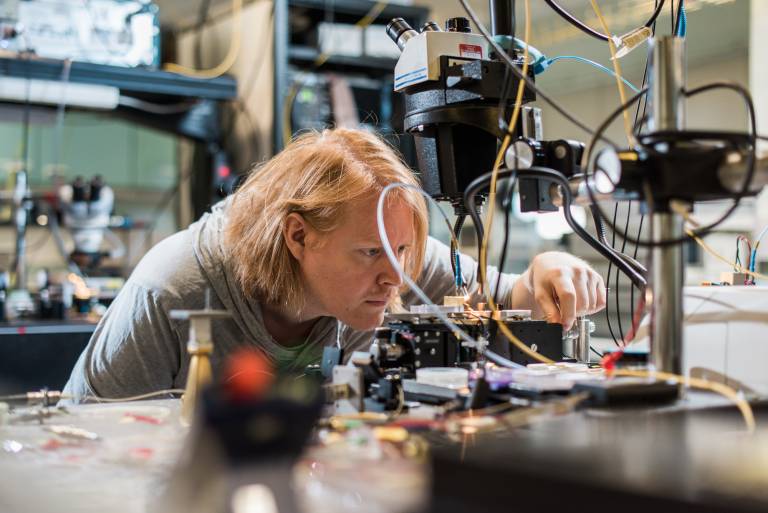New UCL-Cambridge Centre for Doctoral Training in Connected Electronic & Photonic Systems (CEPS)
7 February 2019
Graduates from the Centre’s four year PhD programme will lead new industries combining electronic and photonic systems. Following the Government's announcement on 4th February 2019, the new CDT is recruiting for MRes/PhD students now!

UCL and Cambridge University have successfully gained over £5 million funding for a new UK Research and Innovation (UKRI) Engineering and Physical Sciences Research Council (EPSRC) Centre for Doctoral Training (CDT) in Connected Electronic and Photonic Systems (CEPS). The new Centre builds on the enormous success of the EPSRC funded collaboration between these two world-leading universities, who set up joint CDTs for Photonic Systems Development in 2009 and Integrated Photonic and Electronic Systems in 2013.
The new Centre aims to train researchers to lead a new generation of industries providing products and systems, connecting electronics with photonics. The Centre brings together multi-disciplinary, cutting edge research activities from groups in electronic engineering, communications, photonics, nanotechnology, physics, materials, computer science, manufacturing, biomedical engineering, biotechnology, civil engineering and chemical engineering with contributions from more than 35 collaborating companies to provide an outstanding training environment for its students[1]. The funding announced today will enable 5 cohorts of PhD students to be trained in the Centre over the next 8 years.
Director of the new Centre, Professor Alwyn Seeds from UCL Electronic and Electrical Engineering said:
“We are delighted that the UKRI EPSRC has funded the new Centre in Connected Electronic and Photonic Systems. Given the success of our existing Centre in Integrated Photonic and Electronic Systems over the last 5 years, we believe that the time is now right for the new Centre to move ahead and train researchers who are able to carry out world-leading research treating wireless, photonic, electronic and sensor technologies as integral components, circuits and systems on which the next generation of digital technologies depend, thus providing future leaders in the creation of the hardware for the ICT systems of the future. These leaders will be key enablers of the hardware for the big data, blockchain, edge computing, immersive experience, Internet of Things (IoT), Industry 4.0 and other systems of the future. Such systems are set to become much more complex and will rely on a series of new underpinning technologies. The new Centre will use and extend best-practice built up from the innovative teaching and learning techniques developed by the current CDT in Integrated Photonic and Electronic Systems (IPES). The importance of this innovative approach to the creation of future systems has become clear through the research advances and training impacts achieved. In creating the new Centre, we have brought together key research groups from Cambridge and UCL to create a training environment of unparalleled richness.
UK electronics and UK photonics are large industries with annual revenues of £78 billion and £11 billion respectively. We have been very pleased to have the strong support of more than 35 leading companies who will contribute to the work of the new Centre."
Director of Research for the new Centre, Professor Richard Penty, from the Engineering Department, University of Cambridge said:
"The vision of the Connected Electronics and Photonics CDT is to create a new generation of researchers who are able to carry out world-leading research in integrated circuits and systems which incorporate electronic, photonic and wireless components, thus providing future leaders in the creation of the connected electronic and photonic systems upon which society will depend. The change in systems that this will enable is as profound as the development of the personal computer from a simple stand-alone device to the fully networked information appliance that we have today. The benefits to the UK economy will be correspondingly large."
The CDT in Integrated Photonic and Electronic Systems is one of 75 Centres for Doctorial Training which will share £446million of EPSRC funding, that will be used to train some 3,750 post graduate students across 31 universities. EPSRC, part of UK Research and Innovation (UKRI), announced the new investment at a special launch event, held at the London Stock Exchange today.
Science Minister, Chris Skidmore, said:
“The Centres for Doctoral Training at universities across the country will offer the next generation of PHD students the ability to get ahead of the curve. In addition, this has resulted in nearly £400 million being leveraged from industry partners. This is our modern Industrial Strategy in action, ensuring all corners of the UK thrive with the skills they need for the jobs of tomorrow."
“As Science Minister, I’m delighted we’re making this massive investment in postgraduate students as part of our increased investment in R&D.”
[1] Project partners involved with the Centre include: Airbus Defence and Space, Analog Devices, Anvil Semiconductors, aXenic, BAE Systems, BT, Chromacity, Continental Automotive, DSTL, Eblana Photonics, Eight19, Faz Technology, Hitachi Cambridge Laboratory, Huber+Suhner Polatis, Inphenix, Integer Holdings, Leonardo MW, Microsoft Research, Oclaro, Optalysys, PervasID, Phasor Solutions, Photon Design, Plessey Semiconductors, PragmatIC Printing, Precision Acoustics, Stryker International, Teraview, Thales Group (UK), The Rockley Group (UK), Toshiba Research Europe, VividQ, Xilinx, Xtera Communications, Waveoptics, Zilico, Zinwave.
 Close
Close

